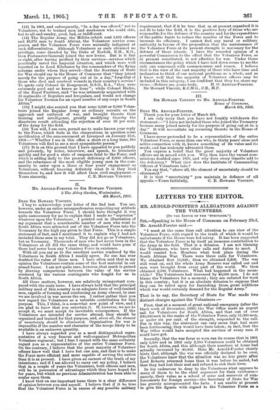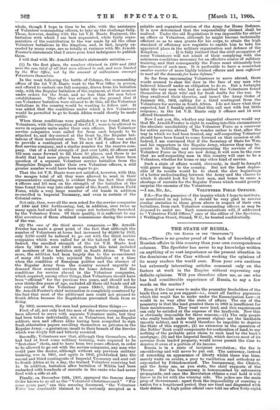(TO THE EDITOR OP THE "SPECTATOR:1
Srn,—Speaking in the House of Commons on February 23rd, Mr. Arnold-Forster said :— " I must at the same time call attention to one view of the Volunteer Force, with regard to the truth of which it would be unfortunate if the House were led astray. It has been suggested that the Volunteer Force is by itself an immense contribution to the Army in the field. That is a delusion. I am not blaming the Volunteers, who have other calls and duties to meet. I would remind hon. Members what took place during the South African War. There were three calls for Volunteers. We obtained first 11,000; then we obtained 6,300. The war still went on, and the whole Army Reserve was called out and men were brought from every part of the world. We then obtained 2,580 Volunteers. What had happened in the mean- while ? The Volunteers had increased by 40,000 men. I do not blame the Volunteers for a moment; they are enlisted for work in this country ; but it is an absolute delusion to suppose that they can be relied upon for furnishing those great additions which war would certainly demand for the Regular Army."
That is to say, the Secretary of State for War made two distinct charges against the Volunteers :—
First, that at a moment of great national emergency (after the black week of December, 1899) the War Office made an urgent call for Volunteers for South Africa, and that out of over 200,000 men in the ranks of the Volunteer Force, only 11,000 men, or under six per cent. of the strength, responded to the call. Put in this way, the statement can only mean that. had more been forthcoming, they would have been taken ; in fact, that the War Office would have accepted the services of every man it could have got.
Secondly, that the war fever so soon ran its course that in 1901 only 5,300 and in 1902 only 2,580 Volunteers could be obtained for South Africa, and this although their numbers at home had actually increased by 40,000. Here Mr. Arnold-Forster clearly hints that, although the war was officially declared to be over, the Volunteers knew that the situation was no less grave after Lord Roberts returned home than it was before he sailed, but that they had lost their zeal and refused to risk their lives.
In his endeavour to deny to the Volunteers what appears to many of them to be the chief argument for their existence— namely, their value as a school of arms and reservoir of rein- forcements for foreign service—the Secretary of State for War has gravely misrepresented the facts. I am unable at present to give the figures with regard to the Volunteer Force as a
whole, though I hope in time to be able, with the assistance of Volunteer commanding officers, to take up the challenge fully. Those, however, dealing with the 1st V.B. Hants Regiment, the battalion with which I am best acquainted, while fairly repre- sentative of the contribution to the war made by all the other Volunteer battalions in the kingdom, and, in fact, largely ex- ceeded by many corps, are so totally at variance with Mr. Arnold- Forster's statements that I crave your kind indulgence to publish them.
I will deal with Mr. Arnold-Forster's statements seriatim
(1) In the first place, the numbers obtained in 1900 and 1901 were the sum total of all that were allowed to sail, and were limited by the War Office, not by the amount of enthusiasm amongst Volunteers themselves.
In the week following the battle of Colenso, the commanding officer of the 1st V.B. Hants went to the War Office in person, and offered to embark one full company, drawn from his battalion only, with the Regular battalion of the regiment, at that moment under orders for the front, and no less than 300 men below establishment. This offer was refused on the ground that if one Volunteer battalion were allowed to do this, all the Volunteer battalions in the country would be wanting to follow suit. It was 'added that the conditions under which a few Volunteers would be permitted to go to South Africa would shortly be made public.
When these conditions were published, it was found that no Volunteers, with the exception, of the C.I.V., were to be allowed to serve in separate units under their own officers. But Volunteer service companies were called for from each brigade to be attached to,.and dry-nursed at the front by, the Regular bat- talions of their territorial units. The 1st V.B. Hants was asked to provide a contingent of but 24 men and 1 officer for the first service company, and a similar number for the reserve com- pany. Out of a total strength of just over 1,000, 10 officers and 163 men came forward to fill these 50 places, and there is no doubt that had more places been available, or had there been question of a separate Volunteer service battalion from the Hampshire Brigade under their own Volunteer officers, a still greater number would have been eager to go.
That the let V.B. Hants were not satisfied, however, with this, the meagre total of all they were allowed to send in their representative contingent, is evident from the fact that other 4 officers and 101 men on the strength of the battalion at the time found their way into other units of the South African Field Force, while a very large number of old hands in addition re-enrolled in Imperial Yeomanry, and even in certain of the Colonial corps.
Not only, then, were all the men asked for the service companies of 1900 and 1901 forthcoming, but, in addition, over twice as many again had sailed in other corps not technically furnished by the Volunteer Force. Of their quality, it is sufficient to say that seventeen of them obtained commissions during the course of the war.
(2) The case of the third service companies. — Mr. Arnold- Forster has made a great point of the fact that although the number of Volunteers at home had increased by 40,000 by 1902, only 2,580 could be induced to go out with the third service companies which were called for at the tail-end of the war. Indeed, the enrolled strength of tho 1st V.B. Hants had risen by 1902 to over 1,600 men, though this total included all members of the battalion still in South Africa. What is more, the addition had been largely due to the re-enrolment of many old hands who rejoined the battalion at a time when the . condition of European politics and the absence of the Regular Army from the country seemed urgently to demand their renewed services for home defence. But the conditions for service abroad in the Volunteer companies, which required, among other things, that Volunteers should have been " efficient " for the previous two years, and should not be over thirty-five years of age, excluded all these old hands and all the recruits of the Volunteer years 1900-1, 1901-2. Hence Mr. Arnold-Forster's chief insinuation is completely countered by the fact that most of the additional men could not proceed to South Africa because the Regulations prevented them from so doing.
By 1902, moreover, the men had perceived three things:— First of all, not only had the men of the service companies not been allowed to serve with separate Volunteer units, but they bad been taken individually, not as Volunteers, but as Regular soldiers, men and officers alike having been compelled to sign fresh attestation papers enrolling themselves as privates in the Regular Army,—a gratuitous insult to their branch of the Service which was deeply felt and bitterly resented.
Secondly, Volunteers saw that, although they themselves, who bad had at least some military training, were required to be
first-class" shots, and to have been two years efficient, in order to be allowed to go out with the service companies, any man who could pass the doctor, although without any previous military training, was in 1901, and again in 1902, pitehforked into the second and third contingents of Imperial Yeomanry and sent out to South Africa at 5s. a day, the trained Volunteer receiving but ls. In addition, battalion after battalion of Militia had been embarked with hundreds of recruits in the ranks who had never fired with a rifle at all.
Finally, on December 24th, 1901, appeared tho famous Army Order known to us all as the "Volunteer Christmas-card." "For some years past," ran this amazing document, "the Volunteer Face has- constantly blaimed - to be seriously accepted as a
reliable and organised section of the Army for Home Defence. It is now determined that the responsibility claimed shall be realised. Under the old Regulations it was impossible for either an officer or Volunteer, although he might become technically efficient so as to earn grants for his corps, to attain the high standard of efficiency now requisite to enable him to take his appointed place in the military organisation and defence of the
Kingdom It is fully realised that the civil occupation of some Volunteers will not admit of their complying with the minimum conditions necessary for an effective course of military training, and that consequently the Force must ultimately lose the services of such men. It is preferable to have a somewhat smaller number of more highly trained officers and men sufficient to meet all the demands for home defence."
So far from encouraging Volunteers to serve abroad, these words seemed to slam the door in the face of any man who believed himself under an obligation to do so. But a fortnight later the very men who had so snubbed the Volunteers found themselves at their wits' end for fresh drafts for the war. So they swallowed their theories, and issued the Army Order of January 9th, 1902, calling for a third contingent from the Volunteers for service in South Africa. I do not know what they expected, but I frankly admit that this call met with but little response ; in the 1st V.B. Hants only 3 officers and 14 men offered themselves.
Now I ask you, Sir, whether any impartial observer would say that Mr. Arnold-Forster is right in reading into this circumstance the absolute unreliability of the Volunteer Force as a reservoir for active service abroad. The wonder rather is that, after the way in which we had been treated, any self-respecting Volunteer should have been found to come forward on that occasion at all. Indeed, I am convinced that if the Secretary of State for War, and his supporters in the Regular Army, whoever they may be, persist in belittling and misrepresenting the services of the Volunteer Force as they are now doing, it will soon be the case that no self-respecting man in this country will care to be a Volunteer, whether for home or any other kind of service.
Such a state of affairs would, obviously, in itself be fraught with grave danger to the country. But not the least deplor- able of its results would be to check the slow beginnings of a better understanding between the Army and the classes to which it should look for its best men, and hence to cause a shortage of recruits for the Regular Forces which would greatly surprise the enemies of the Volunteers.
—I am, Sir, &c., VOLUNTEER FIELD OFFICER.
P.S.—For the purpdses of the inquiry which I hope to institute, as mentioned in my letter, I should be very glad to receive similar statistics to those given above in respect of their own battalions, from such Volunteer commanding officers as may be disposed to assist me. Such communications will, if addressed to " Volunteer Field Officer," care of the editor of the Spectator, 1 Wellington Street, Strand, W.C., be treated confidentially.











































 Previous page
Previous page